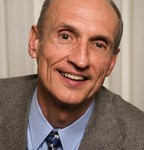Carl Sgrecci, vice president of finance and administration, will be awarded with the first “Polished Apple” from the Toastmaster’s Club in honor of his 43 years of dedication and service to the school as an alumnus, professor and administrator.
The Toastmaster’s Club works to help people learn the art of public speaking. The club aims to improve the way in which people present to others by teaching them to effectively engage their audience.
Staff writer Sage Daugherty spoke with Sgrecci about receiving recognition from the Toastmaster’s Club and about long history at Ithaca College.

Sage Daugherty: Why did you choose to come to Ithaca?
Carl Sgrecci: I’ve been here forever. I was a transfer student at Ithaca College. I went to Corning Community College for two years and then transferred to Ithaca College in the fall of 1967, majored in accounting and graduated in 1969. I went on to Syracuse University to get my MBA in finance, and it was a strange combination of circumstances, but since I was going to be starting work on my MBA, they invited me to come back and teach accounting in the fall. So I started to teach the year after I graduated, and after being on the faculty for six years, I became a vice president in 1984 and have been vice president ever since. I’ve really felt privileged to experience the college from a variety of fronts. I’ve been a student, I’ve been a faculty member, I’ve been an administrator.
SD: Why did you decide to retire this year?
CS: Working here so long was just pure accident. I loved teaching. I got into it, and I had a great year, and I wasn’t that much older than most of the students, but I just enjoyed what I was doing. And I think I did a good job because they asked me if I wanted to come back again. They kept asking me to come back, and I came back for six years. I worked hard and people kept asking me to do different things, and before you know it 43 years have gone by. So in terms of why I’m retiring, I’m going to be turning 65, there are things that I want to do, and so the timing just seemed right.
SD: Describe some of the changes you have seen over the years at the college.
CS: It’s really been exciting, because I’ve seen a good portion of the campus built. When I first came, Dillingham Center was under construction. I used to have a little Volkswagen Bug, and it seemed like every morning I was following cement mixers up the street. I was here when that silver [Textor] ball was hauled across campus on a flatbed truck. It was all wrapped in black plastic, and everybody wondered what it was, and they kept it under wraps until the 75th anniversary celebration. The business building, the Peggy Ryan Williams Center, the Park School of Communications building, none of those were there when I came, so I’ve seen a lot of campus development take place.
SD: Why did you receive the “Polished Apple” award?
CS: I’m asked to speak before different groups to talk about the finances of the college. Fundamentally I’m still a teacher, and I enjoy teaching, and some aspects of the finance can get complicated, so I truly try to break it down into a simpler form and try to illustrate it so that you can get some complex topics across to people, and I try not to bury them in it. That’s what I think was acknowledged: People recognize that I seem to be able to take complex stuff, or what’s perceived to be complex stuff, and explain it in a way that they can grasp it. And I try to use a little humor, because finance stuff can be dry.
SD: What are your retirement plans?
CS: I came from a farm family, my wife came from a farm family. We ended up building our home here in Ithaca on her family farm, and some of the buildings have gotten old and need attention. I like to work with hammers and nails and those kinds of stuff, so we’d like to preserve some of the buildings as much as we can — to preserve them they need a little attention. So I can do that at my own speed instead of having to work on it on weekends and nights while I’m working. And I want to travel a little bit and spend more time with the family.







